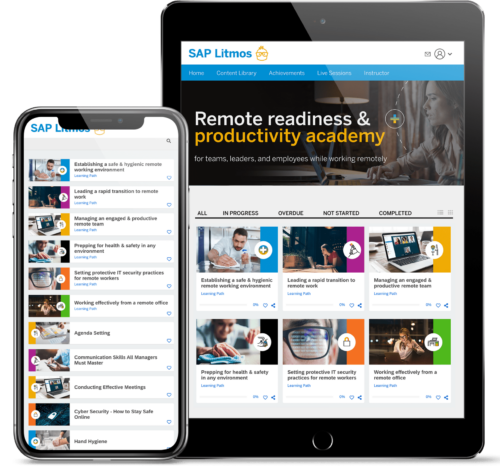Knowledge is Hope: Training in Times of Change & Challenge
Let me start by articulating the most important point of this post: during these exceptionally challenging times, Litmos is committed to supporting our customers and helping you navigate unprecedented circumstances. We encourage you to reach out for extra assistance, if needed, even for a bit of reassurance or to collaborate on overcoming new challenges. We are here for you.

Training & Technology Take on Increased Importance
Never has online training served a more important purpose. Perhaps in the past we took certain technologies for granted because we’re accustomed to being able to instantly communicate, search, browse, create, share, swipe, etc. But now, in the face of the COVID-19 (coronavirus) pandemic, technologies that connect people to information and to each other take on elevated significance.
We’re all in varying forms of isolation – whether with families, roommates, or alone – and now, we realize more than ever the value of staying engaged with our communities outside the walls of our homes. This is true in both our personal and professional lives.
In the professional realm, despite tremendous economic uncertainty, many organizations are choosing to increase spending on digital learning technologies, as well as on other IT products/services that support remote workers, such as endpoint security applications, VPN solutions, video conferencing, collaboration software, and others.
In the world of corporate learning, companies are hurrying to implement a better LMS and find ready-to-go video content that takes the place of onsite training classes. They’re scrambling to equip instructors with virtual delivery technology – items such as high-quality web cameras and headsets with microphones – as traditional instructor-led training (ILT) courses must be rapidly converted to virtual ILT.
The Role of the LMS during Crisis
During this massive transition to remote work and a greater reliance on technology, the learning management system (LMS) plays a central role in keeping employees, customers, and the extended enterprise informed, engaged, and connected. Not only should internal and external learning initiatives continue, they should be amped up because people are seeking answers and assurances.
During normal times, it may be true that “knowledge is power.” But, during times of change and challenge, it may be more appropriate to say that “knowledge is hope.” Yes, these days the LMS serves as a beacon of hope. Training and HR professionals can comfort learners with the fact that information is still flowing – that they are not alone or tasked with having to figure things out on their own.
Training Industry captures this idea very well:
Training can provide a constant during challenging times. Being able to focus on learning a new skill while connecting with co-workers can be a rewarding experience, and improved morale is especially important in times filled with change.
Indeed, we are reminded that beyond learning, the LMS is a portal for making people feel better and for fusing connections.
Here are a few ideas on how your LMS can inspire hope in your learning communities:
- For Employees: Given social distancing recommendations and travel restrictions and bans, employees may feel isolated and disoriented. Training managers can coordinate with HR and change management teams to deliver courses on topics such as working from home effectively, contingency plans and procedures, physical health and hygiene, mental wellness in stressful times, and countless others. L&D can also use the LMS to post critical messages, precautions, and changes. Further, you can take advantage of social learning, gamification, and collaboration capabilities to drive interaction, energy, and fun.
- For Customers: Customers expect to know how you plan to address the current situation and if it will affect how they use your products or access your services. You can utilize the LMS to communicate the business continuity strategy and give them the knowledge they need via quick, micro-courses. It’s a bit of a spin on how you’d regularly think of customer training, but in times of crisis, the LMS is the perfect portal for delivering dynamic, interactive information (that you deliver like a course). It’s also ideal for posting critical messages and collecting customer feedback.
- For the Extended Enterprise: Your partners, contractors, freelancers, and other segments of your extended enterprise certainly want to know where they stand. The LMS enables you to create learning paths for different audience types to get the right information to the right groups. Similar to employees, these people may be feeling unsure and anxious about their business relationship with you going forward. You can take advantage of the LMS to keep them in the loop with quick, informative courses that outline business continuity and contingency plans, while simultaneously putting their minds at ease.
In closing, a global crisis like the one we’re experiencing opens our eyes to the power of the technologies we use every day. It makes us think about how difficult life would be without them. Instead, we live in a time where we can check on each other from anywhere, anytime, across cellular networks; we can see each other’s faces on video; we can access instant data updates online. And in the learning world, we can continue to support people with knowledge that enriches their lives.





